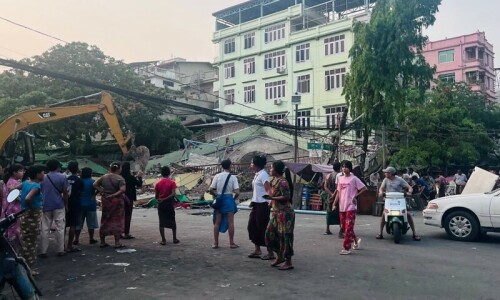• CJP seeks end to ‘controversy’, doesn’t want to complicate matters by examining army act
• AGP assures court no woman or juvenile will be handed over to army
• Hearing may be closed by 27th
ISLAMABAD: The federal government informed the Supreme Court on Friday that a total of 102 civilians, arrested from various parts of the country in the wake of May 9 violence, were in the military’s custody.
But the figure does not include any woman or juvenile, though a medical test was being conducted to determine the exact age of one individual who would be sent back if found to be underage, said Attorney General for Pakistan (AGP) Mansoor Usman Awan.
He shared the information with a seven-judge bench in response to its direction to furnish the total number of persons in the civil and military custody for offences allegedly committed by them during May 9 incidents. The top court had directed that the information should also include how many of such detenues were women and juveniles and also how many advocates and journalists were in custody.
Headed by Chief Justice of Pakistan (CJP) Umar Ata Bandial, the bench that had taken up a set of challenges to the trial of civilians in military courts, dropped hints of closing the hearing by Tuesday.
It is expected that former law minister Dr Farogh Naseem may represent Prime Minister Shehbaz Sharif when the court will resume hearing on Monday.
During the hearing, the CJP observed that the court wanted a simple resolution of the controversy over trial of civilians in military courts rather than going into the vires of Section 2(d)(i) of the Pakistan Army Act (PAA) 1952, since it will only complicate the matter.
The AGP assured the bench that no woman or juvenile would be tried in military courts, adding 39 women had already been sent to judicial custody and 42 others released in Punjab.
In Sindh, he said, 117 people were in judicial lock-up, 345 have been granted bail while 70 were cleared of all charges.
The AGP assured the court that no advocate or journalist was in military custody. In Khyber Pakhtunkhwa, four people are in the civilian custody — two each in Peshawar and Abbottabad, he said.
In Punjab, 21 people were sent to jail under the MPO, 232 released on bail by the ATC and 500 discharged. Likewise, 3,012 people have been granted bail while 1,201 discharged in other cases.
While pointing towards Khwaja Ahmed Hossain, who was representing former chief justice Jawwad S. Khawaja, CJP Bandial observed that the exception of extending certain rights to foreign national Kulbhushan Jadhav was due to directions issued by the International Court of Justice.
The CJP also cited the observation of Justice Syed Mansoor Ali Shah highlighting certain areas of work which directly involves the army, like in the case of national security or the involvement of a civilian in hatching a conspiracy with the help of a sitting army officer which is a serious offence.
He wondered about the criteria for bringing civilians into the net of military courts, regretting that the order of the ATC’s administrative judge to hand over the custody of civilians to the military administration was not a speaking order since it lacks reasons and material.
When the CJP asked about any policy towards journalists and lawyers, the AGP replied that there was none.
At this, the CJP asked Mr Awan to communicate to the provinces, including the two caretaker governments, to make some policy about journalists and lawyers since it involves civilian rights and therefore vital for inculcating confidence in society.
The journalist tells us the truth, though sometimes they mixed up things for storytelling, he observed.
“We want government’s assurance not by way of judicial order rather by taking note of the facts,” the CJP observed, adding “we should restore peace and calmness in the society by lowering the temperature”.
Loss of faith in ordinary courts
Advocate Hosain argued that the federal government should justify the circumstances for losing its faith in ordinary courts and why such large number of civilians should be tried in military courts.
He argued that fair trial under Article 10A of the Constitution was an unqualified right, not subject to any reasonable restrictions.
But the court martial of civilians did not comply with the requirement of Article 10A because such courts were not independent of the executive influence since it consists of serving military officers who will be acting as judges.
Moreover, he said, the proceedings were not open rather secret, adding that such forums did not announce speaking orders or reasoned judgements. The court martial proceedings also lacked meaningful right to appeal though now an appellate forum has been provided by the army chief but again this forum consists of army officers.
And though the aggrieved party could approach a high court, but for judicial review and not for appeal, the counsel said, adding that if the lordships considered that he had a good case but the hands of the court were tied up because of the 2015 judgement in the 21st Constitution Amendment case, the court can consider constituting a full court consisting of all the judges. The 2015 judgement did not stop the court from striking down the vires of Section 2(d)(i) of the Army Act.
The SC in the 21st Amendment case, by a majority of 11 to 6, had declared as intra vires, the trial of a terrorist in the military courts.
Justice Shah observed, “I would be more comfortable if the same number of judges who heard the 2015 judgement, be assembled to hear the matter at hand”.
Earlier, Advocate Faisal Siddiqui, representing a group of civil society, argued that his clients had challenged the forum of criminal trials and not the trial of offences registered against civilians in the backdrop of May 9 violence.
Published in Dawn, June 24th, 2023














































